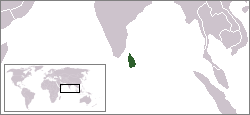This article includes a list of references, related reading, or external links, but its sources remain unclear because it lacks inline citations .(May 2017) |
| Chunnakam Police station massacre | |
|---|---|
 Location of Sri Lanka | |
| Location | Chunnakam, Northern Province, Sri Lanka |
| Date | 8 January 1984 (+8 GMT) |
| Target | Sri Lankan Tamil Civilians |
| Deaths | At least 19 |
| Injured | Unknown |
| Perpetrators | Sri Lankan Police |
The Chunnakam Police station massacre refers to the killing of 19 ethnic Tamil civilians by the Sri Lankan Police, at Chunnakam, a suburb of Jaffna in 1984. This was among the first of the series of massacres of Tamil civilians by the Sri Lankan state forces, since the outbreak of the Sri Lankan Civil War.